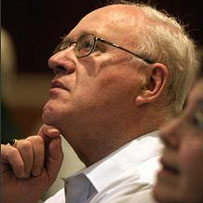Don't believe his defenders: George Carey was right to resign
The career of former Archbishop of Canterbury George Carey ended dramatically. Ten days ago he resigned as an honorary assistant bishop in the Oxford diocese after being asked by the current Archbishop, Justin Welby, to consider his position. That letter came in response to the findings of the Gibb inquiry into the Church of England's handling of the case of Bishop Peter Ball, jailed in 2015 for misconduct in public office and indecent assault. Ball had admitted the abuse of 18 young men. One of his victims, Neil Todd, took his own life in August 2012. He had reported the abuse but believed the Church had failed to take him seriously.

Was it right that Carey should effectively be fired and that his life as a CofE bishop should be ended so peremptorily? Not everyone thinks so.
Jules Gomes wrote on Conservative Woman that Welby had 'thrown George Carey to the wolves'.
Another of Carey's paladins is his son Andrew, who wrote for the Church of England Newspaper regretting 'the absence of any public expression of sadness and sympathy for my father from the current crop of archbishops and bishops'.
'It's no matter that the term "safeguarding" hadn't even been coined when Bishop Peter Ball's crimes were first reported...Twenty-five years later you are held accountable for cultural attitudes and standards that are totally different today,' he says.
Another defence is mounted by Martin Sewell, a retired child protection lawyer and General Synod member writing on the Archbishop Cranmer website under the headline: 'Lord Carey's forced resignation is an injustice: he, too, was a victim of Peter Ball.'
Sewell argues against singling out Carey for blame, saying: 'Archbishop Carey was ultimately responsible, but his brother bishops and the church structures of the time gave him scant help... Individualising the responsibility is not helpful because the very function of the scapegoat is to remove the sin from others. To coin a current phrase, the inadequacies from this time were of the many, not the few.'
It is hard not to feel some sympathy for Carey, whose service to the Church has been long and distinguished. He has, according to his lights, been a faithful servant of the gospel.
But his defenders' arguments amount to this. Those were different days; safeguarding wasn't a thing a few decades ago; Ball was devious and manipulative; everyone thought they were doing the right thing.
It's not enough, and this is why.
First, there are explicit criticisms of Carey in the Gibb report that make it simply impossible to argue that he was a 'victim' of Ball, as Sewell suggests. Among other things, the report says he was 'significantly involved in' the way in which the Church treated Neil Todd in 1992/93, the failure to ensure that complaints about Ball's conduct were adequately followed up or passed to police and the decision not to include Ball's name on the 'Lambeth List' of those barred from ministry. He was involved in providing Ball with significant funds, and in enabling him to return to ministry.
Carey admitted mistakes. But, says the Gibb report, 'the extent to which he accepts any personal responsibility is limited. Almost every expression of regret is in the plural... and is tempered by a reference to the failures of the wider Church.'
Carey referred to Ball as being 'basically innocent', even knowing of his behaviour. He described him as 'overall... a wonderful priest and bishop' – again, knowing much of what Ball had done. In 1993, when Ball was facing indecency charges and resigned as Bishop of Gloucester, he attempted to intervene with the Chief Constable of Gloucestershire on Ball's behalf, saying, 'the testimony from many young men whom he has helped over the years – and the list must run in hundreds – is such that if he is guilty of unprofessional behaviour it is quite unrepresentative of his style...'
Based on exhaustive testimony and documentation, the Gibb report says: 'Lord Carey set the tone for the Church's response to Ball's crimes and gave the steer which allowed Ball's assertions that he was innocent to gain credence.'
Describing Carey as a 'victim' alongside the vulnerable young men abused by Ball is not credible. If he was a dupe, he was a culpable dupe, and out of respect for Ball's real victims Welby was absolutely right to take the action he did.
Is it a sad end to a career? Yes, it is. But the Church must always be held to a higher standard than the world, because it claims to hold itself to that standard. It is there for the poor, the weak and the vulnerable. When it privileges the voice of the powerful and persuasive over those it is there to serve, it has failed at the most basic level. Carey is inextricably implicated in that failure.
It's fair to warn, as Sewell does, against scapegoating anyone. But if everyone's guilty, no one's guilty. The principle of collective responsibility must never be used to let someone off the hook when they've done something wrong.
Ironically, there's a exact parallel with the Carey case from another, just a few years ago. In October 2014 the former Archbishop of York, David Hope, was criticised over his handling of an abuse case in the Cahill Inquiry into the former Dean of Manchester, Robert Waddington. The criticisms were mild in comparison to the ones made of Carey, but he resigned his ministry unprompted.
There's a tendency, in Christian circles, to circle the wagons around respected public figures who turn out to have failed, in life or in ministry. It must be a conspiracy; they can't really be to blame. Their critics become the enemy. But Scripture warns us against idolising anyone; they all have clay feet.
Follow Mark Woods on Twitter: @RevMarkWoods











